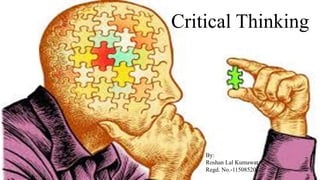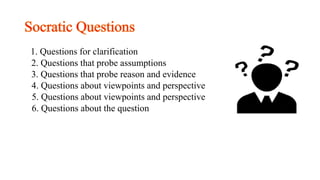Critical thinking
- 1. By: Roshan Lal Kumawat Regd. No.-11508520 Critical Thinking
- 2. • Ability to think clearly and rationally. • Ability to engage in reflective and independent thinking. • Understand the logical connection between ideas • identify, construct and evaluate arguments. • detect inconsistencies and mistakes in reasoning • solve problems systematically • identify the relevance and importance of ideas • reflect on the justification of one's own beliefs and values.
- 3. 1. Questions for clarification 2. Questions that probe assumptions 3. Questions that probe reason and evidence 4. Questions about viewpoints and perspective 5. Questions about viewpoints and perspective 6. Questions about the question
- 4. • Why do you say that ? • How does this relate to our discussion ? • What could we assume instead ? • How can you verify or disapprove that assumption ?
- 5. • What would be an example ? • What is ..... analogous to ? • What do you think causes to happen ........? • Why: ?
- 6. • What would be an alternative ? • What is another way to look at it ? • Would you explain why it is necessary or beneficial, and who benefits ? • why is the best ? • What are the strengths and weaknesses of .......? • How are...... and ........similar ? • What is a counterargument for...?
- 7. • What was the point of this question ? • Why do you think I asked this questions ? • What does.... mean? • How does..... apply to everyday life?







